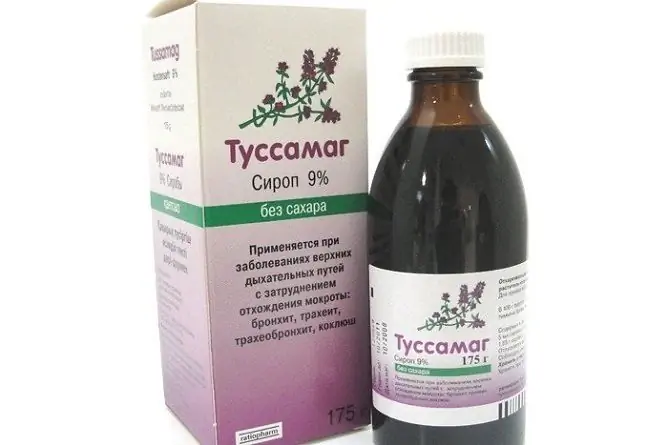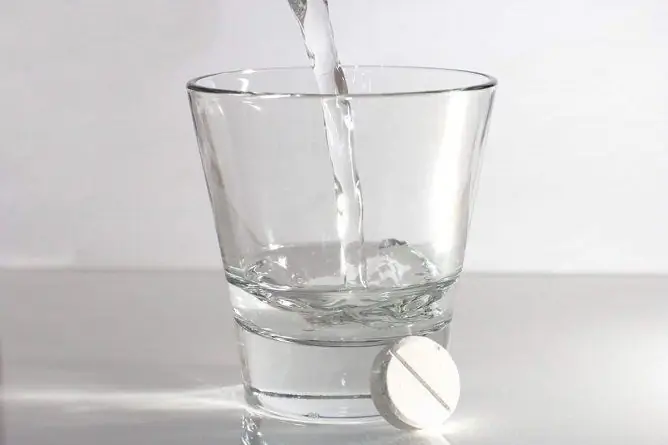- Author Rachel Wainwright wainwright@abchealthonline.com.
- Public 2023-12-15 07:39.
- Last modified 2025-11-02 20:14.
Anti-inflammatory drugs for children
Anti-inflammatory drugs for children are a group of drugs that have analgesic and antipyretic effects, and also target inflammation foci and eliminate them.

Types of anti-inflammatory drugs for children
Anti-inflammatory drugs for children are used to treat inflammatory processes that are accompanied by fever, swelling, inflammation of the lymph nodes, redness and pain. Such processes can include infectious and chronic diseases.
Anti-inflammatory drugs for children include analgesics, corticosteroids, and non-steroidal drugs. The main analgesics include Aspirin, corticosteroids can be used in the form of ointments and eye drops, and Indomethacin is used as the main non-steroidal anti-inflammatory drugs for children.
Anti-inflammatory drugs for children can cause stomach irritation, allergic reactions, impaired hearing and vision, difficulty breathing, and internal bleeding.
Basically, corticosteroids and non-steroidal drugs are used to treat inflammatory diseases in children. Ibuprofen and Mefenamic acid can be prescribed as non-steroidal agents. These drugs do not have serious side effects, but they can cause constipation and digestive upset.
The main effect of anti-inflammatory drugs for children is aimed at lowering the temperature and eliminating foci of inflammation. Simple analgesics are used to treat viral lesions. These include Aspirin and Paracetamol.
For muscle pains, injuries and arthritis, high-potency analgesics are used. Children are not advised to prescribe potent analgesics, which can cause dizziness, headache, nausea and vomiting, internal bleeding and dependence on active substances. The safest analgesics include Paracetamol, which is prescribed for pain syndrome and viral infections.
Anti-inflammatory drugs for children are identical in composition to the hormone that is produced by the adrenal glands during stressful situations and reduced immunity.
Corticosteroids can be used by injection, ointment, and inhalation. Side effects of inhaled corticosteroids are minor.
In the form of tablets for severe asthma and allergic reactions, Prednisolone and Hydrocortisone can be prescribed. Corticosteroids as part of long-term therapy weaken the effect of inflammatory processes and allow the body to overcome the disease.
With prolonged use of these drugs, allergic reactions and redness, irritation of the mucous membrane of the stomach and intestines, weight gain and mental disorders are possible. The dosage for children must be carefully adjusted to avoid the risk of side effects.
Treatment of inflammatory diseases in children
Anti-inflammatory drugs for children with diseases of internal organs should be prescribed after a thorough diagnostic examination in accordance with age and physiological characteristics.
Most often in young boys, inflammation of the foreskin is observed. In case of inflammation of the foreskin in a child, it is necessary to choose the correct treatment, the use of anti-inflammatory drugs, antibacterial ointments and inhalations. In addition to the main anti-inflammatory drug, baths with Furacilin and decoctions of chamomile for rinsing the penis are also recommended, and Levomikol ointment with a compress can also be used.
Among the most common inflammatory diseases in children, pyelonephritis, pyonephrosis, inflammation of the bladder and inflammatory processes in the respiratory system are distinguished.
Anti-inflammatory drugs for children are prescribed in accordance with the diagnosis, degree and complexity of the disease.
With inflammation of the kidneys in a child, Biseptol is prescribed, the daily dosage of which up to 12 years is 2 tablets or 6-8 teaspoons of syrup.

The duration of the course of treatment is 7-14 days. The maximum daily dose of Biseptol for kidney inflammation in a child should not exceed 4 tablets. The drug should be taken after meals with plenty of water. For urinary tract infections, Biseptol is prescribed 3 tablets per day after meals.
For pneumonia in children under 12 years of age, anti-inflammatory drugs should be prescribed in the form of a syrup.
For cystitis and other inflammations of the bladder, anti-inflammatory drugs for children are prescribed in accordance with the stage of the disease and its nature (infectious, chemical, toxic, mycotic and medicinal). Most often, cystitis in children arises from bacteria and viruses, therefore, Penicillin, Cyclofloxacin, Ceftibuten and antimycotic drugs are prescribed. The duration of the course of treatment is 14-20 days.
The treatment of chronic inflammatory diseases in children should be complex in nature and be a combination of anti-inflammatory drugs and fortifying agents (rosehip oil, decoctions of medicinal herbs, vitamin preparations).
YouTube video related to the article:
Found a mistake in the text? Select it and press Ctrl + Enter.






